- Home
- Krav Maga Blog
- Krav Instructors
- Train in Israel
- Tour Train Israel
- Krav Shop
- DVD
- Kickboxing
- IKI Near Me
- Seminars
- IKI Membership
- On-Line Training
- Krav Maga Training
- Testimonials
- History Krav Maga
- Instructors Page
- Past Blogs
- Spanish
- Italian
- Certification
- Contact
- Holland Seminar
- Vienna Seminar
- Poland Seminar
- Italy Seminar
- Belt Requirements
finding willie
By Moshe Katz
May 22, 2011, Europe
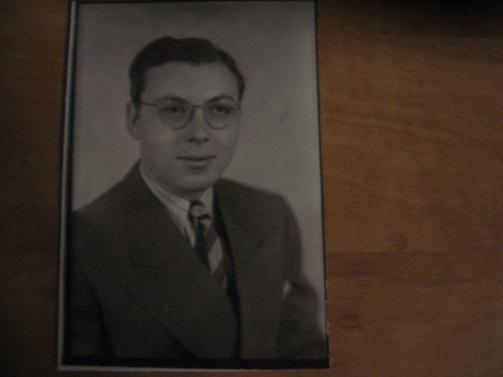
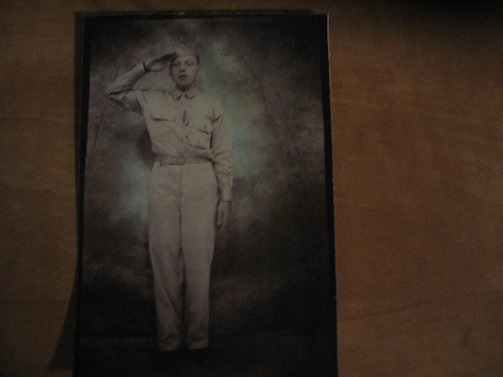
Growing up I had heard about Cousin Willie. My mom's first cousin on her father's side, Rivkah's son. During World War Two the Jews of America responded to the call to arms and joined the army, navy, and air-force. Cousin Willie was killed in the "The Battle of the Bulge". He was only 22 years old. They say he was a shy young man, thoughtful, loving, a good brother and a musician. He played the cornet. He loved music. He wrote home whenever he could, the family still has the letters. I can see that even now, so many years later, he is still loved and missed by the family. I am told that his family never got over the loss and as an old woman his little sister still looked up to her big brother and very much missed him. She was 9 years old, he was 22.
My grandfather, Rabbi Isaac Klein of blessed memory, enlisted at the age of 33, left his family and congregations and served as a chaplain on the European front. He wrote a book about his experiences during the war; "The Anguish and the Ecstasy of a Jewish Chaplain" He tells how he received many letters from his nephew, Willie Newman, and each time he wrote back. He even tried to find him. In each case he was too late; Willie's unit was moving so fast that my grandfather's letters did not teach him in time. Willie wrote, "Uncle, why don't you write to me?" Willie's mother wrote, "Isaac, write the kid!" Eventually all my grandfather's letters came back in the order they were sent out, with the word "deceased" stamped on each one. Willie died thinking his uncle did not care enough to write him.
The family never got over the loss. His parents carried their pain to their death.
Fast forward, May 2011. It has been many years since the end of the war. I am in the Netherlands (known to outsiders as "Holland") to teach Krav Maga. We are all friends now. My students include Dutch, German, Belgians - we train together, we eat together, we laugh together and we discuss the war openly. it is so difficult to image that just a few years ago we would have been shooting at each other.
Two of my students invited me to their home in the Limburg region. They tell me they are only an hour and a half from Bastogne, one of the key sites of the famous Battle of the Bulge. Would I be interested in visiting the site?
Would I!
My eyes light up. Not only was that one of the key battles of World War Two, one that I have studied extensively, but, I tell them, but I have a cousin who lost his life during the Battle of the Bulge. We decide to go.
But the question is, where did my cousin fight? Where did he die? Where was he buried? None of this was known to me. We do some research. There is no Willie Newman buried anywhere in Europe but there is an Irwin W. Newman of Pennsylvania buried at Lorraine American Military Cemetery, St. Avold, France. Could this be him? I know that Willie is from a small town outside of Pittsburgh, Homestead, PA. It seems this might indeed be him.
The cemetery is about 300 kilometers away; it would take us about 4 hours to get there, what should we do? I need to know for sure that this is indeed our Willie.
I wrote to my mother who directed me to Cousin Harriet, the family historian, who directs me to the other cousin Harriet, who is the sister of Willie. She writes, Yes, his name was Irwin Wilbert Newman: "I hope you CAN FIND Willie. He was a wonderful brother, and I was nine years old when he died in action in the Battle of the Bulge."
I show this to my students, he becomes emotional and says, "That settles it, we are going, we are going to find your cousin Willie." And so it will be.
This Dutch family has already adopted three American graves in the American military cemetery in Margraten, Nederlands. They feel the European people owe the Americans a great deal. They take their young daughter Eva with them and teach her that someday she will inherit the honor of visiting these graves and bringing them flowers. During all our visits of historical sites Eva is with us, she is learning history first-hand, she is understanding her roots, not from a book but from touching the ground where history took place.
When the day comes we pack up some food and head out on our way. We stop at the flower shop to pick up some flowers for Willie. We drive. We see the beautiful countryside, cows (Koeien), horses (Paarden), sheep (schapen). The exit signs read "afrit" and "UIT" in Dutch. We cross the the border into Germany. Everything is the same except the signs now read "Ausfarht". There are no guards, no security to be seen anywhere. WE stop for coffee. I am finally getting the hang of the Dutch language and now it is back to German! Soon enough the signs will read "Sortie" (When we cross into Belgium).
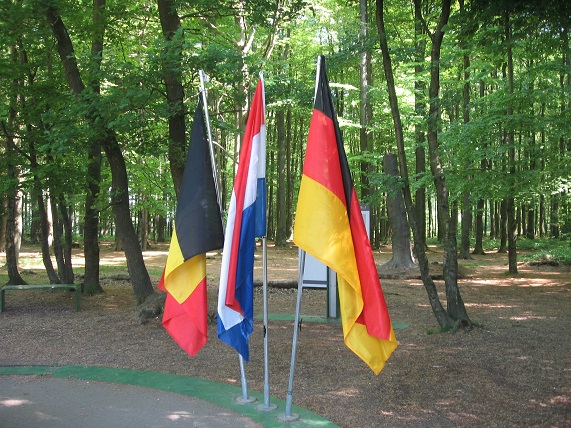
DrieLandPunt - The point where Germany, Netherlands and Belgium meet
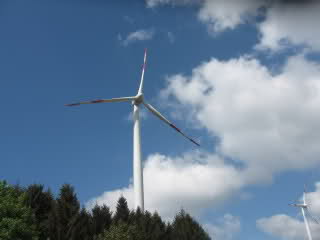
Entering Germany, windmills to produce green energy
Back on the road after our coffee break, we pass signs for Aachen. The name is familiar, this was where Anne Frank's family lived after fleeing Frankfurt, Germany, before settling in Amsterdam. It is also a famous battle site, the first German city conquered by the Americans in World War Two I will see in on another visit, but now we must find Willie. Hours of driving and now we cross an invisible border to Belgium.
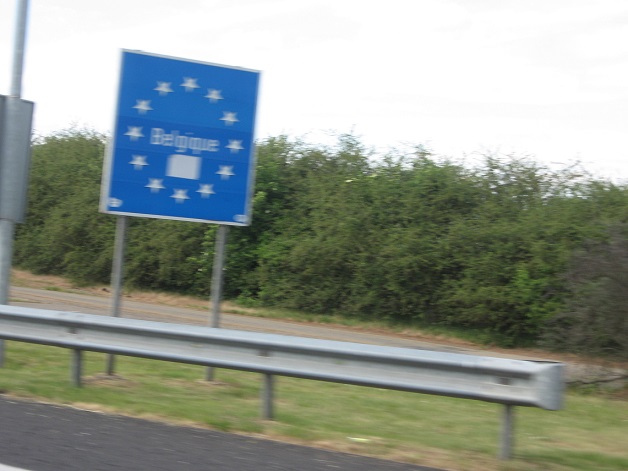
Belgium
Everything is so peaceful; I close my eyes and try to imagine this place during the hell years, the Nazi era; no open borders, only people killing each other, bombing each other's towns and arms. On these peaceful picturesque lands many thousands lost their lives.
Soon we are driving through the Ardennes forests where the last great battles took place. The German forces caught the Americans by surprise. On December 16, 1944, 5:30 a.m. 200,000 German soldiers stormed through these forests. American soldiers were woken by sounds of explosions and tank fire.
We drive south, heading towards France. None of us speak any French.
My thoughts turn to Willie. I try to connect with the battle, with him. I imagine a young man, the cold; it was the coldest January on record, the land was covered with snow. The fear, the uncertainly of combat. Grandpa trying to catch up with him, but not succeeding, the family back home on pins and needles. Willie had been injured in combat. The family received a telegram, Willie earned a "Purple Heart: but soon was back in combat. The American forces were short of men and thus injured soldiers were sent back to combat very quickly.
It is a beautiful day, everything is green. Everything is so peaceful now but in my mind I hear the gunshots, see the snow and the young men in the trenches, or running for cover, tired and cold. I feel like saying, "Cousin Willie, we have not forgotten you. We have not forgotten your sacrifice. I am coming to visit you." We are driving patiently, no one is complaining. We all feel we are on a mission.
Today it is sunny and warm but my thoughts turn to the bitter cold winter of 1945. The Nazis choose the worst weather to attack so that the American could not employ their vastly superior air force. It was too cold and snowy to fly. The Americans were short on supplies, were caught by surprise and had to hold back the advancing enemy at all costs. And this cost was human lives. Over 19,000 Americans lost their lives here, and among them was Cousin Willie.
We cross the border to France, and begin to see the signs for St Avold.
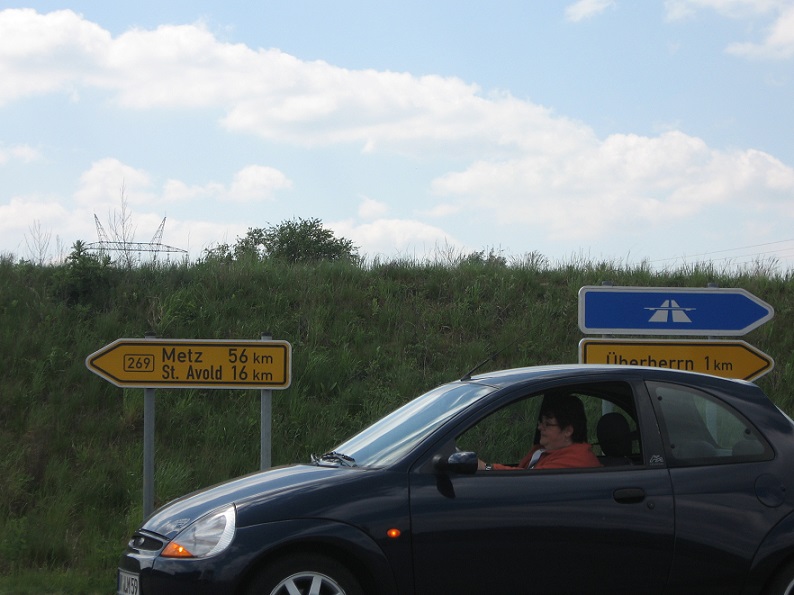
16 km to St. Avold, nearly there
We continue to drive, we all feel the anticipation, no one is speaking, the radio is silent.
Soon we are there....
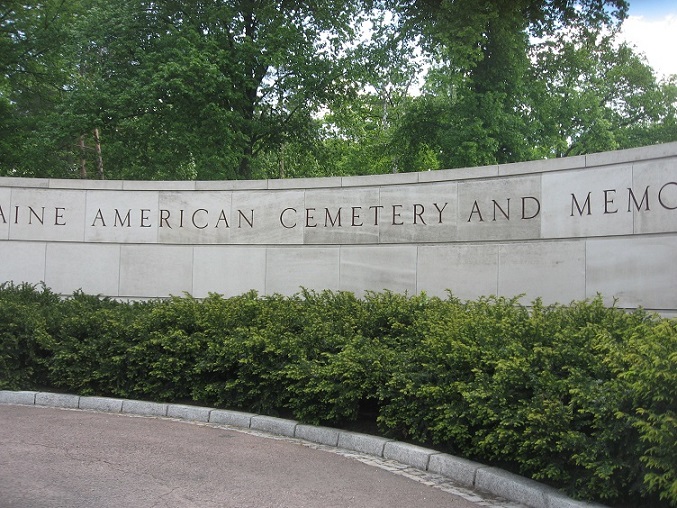
Lorraine American Cemetery, St.Avold, France
I walk into the visitor center. A kind French woman, Mrs. Muller, greets me. "Can I help you?" (from the name she must be German as well).
"Yes", I say, "I am here to visit my cousin". She looks up the name in her records but he is not here. But, she wrote Erwin instead of Irwin. "He is here", I said. I did not come all this way for nothing. She finds his record, indeed Willie is here!
"I will take you to visit your cousin. How old was he?"
"Twenty Two", I reply.
Oh, how tragic. but all the young men buried here are so young, it is all so tragic".
Mrs. Muller works here but the directors are only Americans; that is the rule, only an American can be in charge of these hallowed grounds.
There are 10,489 American soldiers buried here. An entire community that is silent, totally silent. The experience is beyond words. We walk. I am walking among heroes. Every one of these markers was a person, with a name. I read the names. The graves are silent. The trauma of the battlefield, the thundering bombs, the booming tanks, the shattering explosions, are now replaced by the silence and tranquility. Not a sound is heard. A silent community of men who shall reman forever young.
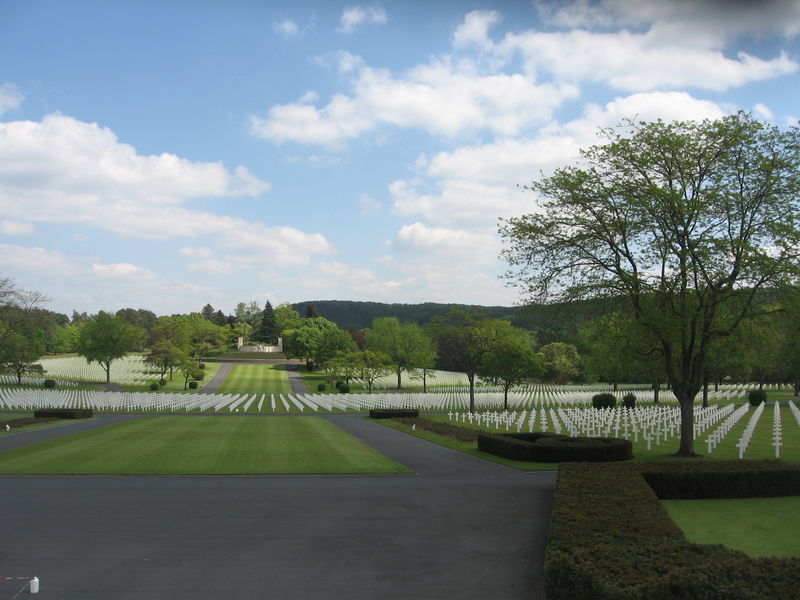
The silent community.
We walk quietly. I see many Jewish stars "There are 202 soldiers of the Jewish faith buried here," she tells me. And there he was, Irwin W. Newman. Private 315th Regiment. 79th Infantry Division, Pennsylvania, January 17, 1945.
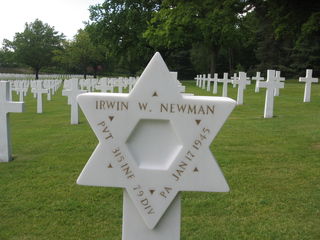
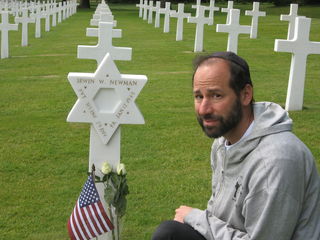
Moshe visiting Cousin Willie. Family reunion.
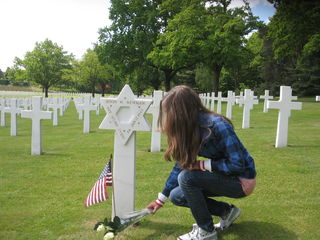
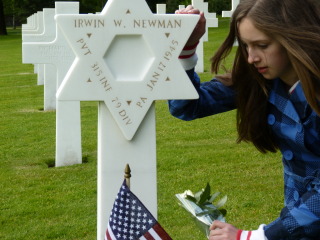
Eva, 12 years old, places flowers at Willie's grave
The French lady said that in the photos it is difficult to see the writing on the tombstones. So she puts sand on the names so it shows up better. The sand is special; it is from the Utah beach in Normandy, where Willie landed. I tell her that my grandfather landed in Utah Beach as well.
She gives me a small American flag to place at his grave. The relative then takes this flag home. On the way back to Israel many people commented on the American flag I was holding. (I id not pack it for fear that it would be damaged). I explained this was no ordinary flag but the flag stood brief at the grave of my cousin who gave his life for our freedom. I told the story again and again, and always people listened in silence, visibly moved. More and more people 'met' Willie. They wanted to know all about him. His story had come to life.
I had never met Willie in his lifetime, but there, I felt so connected, a debt to be paid. What a feeling, we drove through Holland, Germany, Belgium and France for this one moment, a brief visit. Eva placed the flowers on his grave, I said the Kaddish, (The Jewish mourners prayer for the dead) for him: I was so choked up with emotion that at one point I had to stop. I prayed silently. All the feelings came swelling up at once; his death in combat, Grandpa searching for his nephew, Willie writing to Grandpa, 'Uncle, why don't you write?', But now I am here, making that visit that my grandfather so longed to make.
I felt like I had closed a circle, I said to him, "Please know that your uncle tried very hard to find you, but I assume you know that by now, as you have met up in the afterlife." I can picture my grandfather, with that twinkle in his eye, putting his hand on Willie's shoulder. I know this matter gave him no rest, but now the visit has finally taken place. I here on behalf of Grandpa and the entire family. Willie, we salute you.
Silently I introduced myself, ..."I am your cousin", and I explained the exact relationship.
I had come a long way to pay respect to a young man, one of so many, who helped stop the evil that threatened to take over the world. We must sometimes stop and think, that this freedom that we enjoy is not free, someone paid for it, and very dearly. Some young me were told - you will hold this line, you will stop the enemy, and so they did. They were told clearly; many of you will not come back.
They world today might look very different had it not been for these heroes. Mrs. Muller played the "Taps" in honor of Willie (see video at the bottom of this page). The military burial music was heard throughout the cemetery. I felt that we were all paying respect to Willie, we were saluting Willie.
This was his moment.
Willie you are not alone, and you are not forgotten.
said goodbye and then visited as many of the Jews there as I could, I felt they should be visited by a member of their faith. Many were from New York, I found three with the family name Katz, all young men who died in battle. I said to each one: May your rest be a peaceful one.
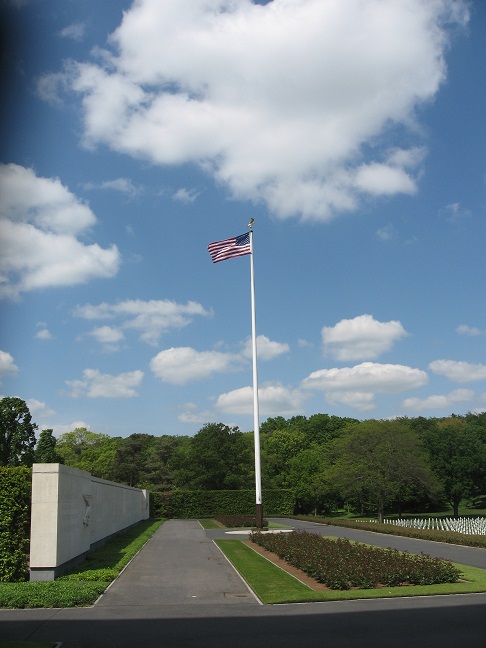
Old Glory flying high
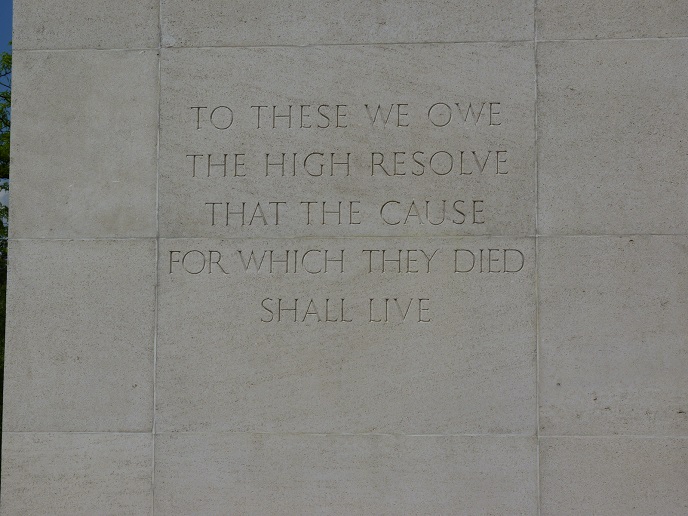
"to these men and their comrades We owe a debt to be paid. with grateful remembrance of their sacrifice and with the high resolve that the cause for which they died shall live"
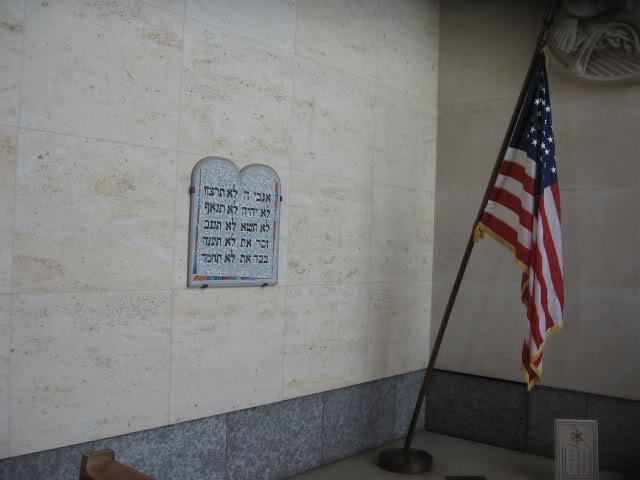
Inside the chapel, respect is paid here to both Jews and Christians who fought side by side, died together and were buried together. Here are the ten commandments in Hebrew next to the American flag.
Historic footage, Willie's unit, Regiment 315, World War Two
We drove next to Bastogne
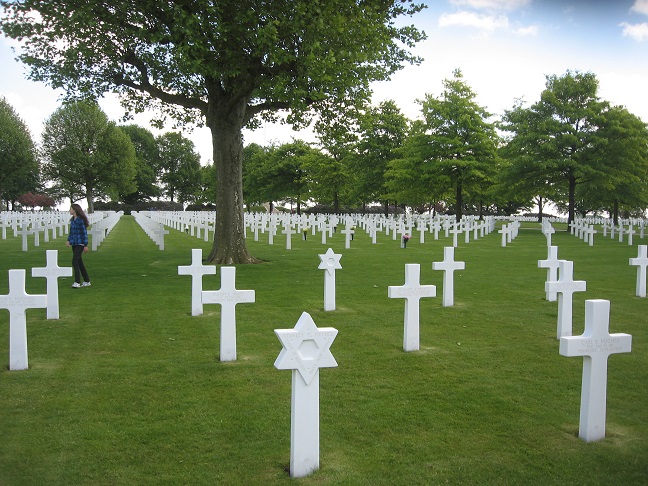
Lorraine American Cemetery, France.
I spent a great deal of time trying to trace Willie's route. I know how he trained in the south (USA), and landed at Utah Beach, Normandy, France on the 14th of June, 1944.
I managed to piece together some information from various sources, it is possible that I have made some mistakes. There is no one alive who seems to have all the details. On the internet I found many people doing the same research but I could not find enough information on the final days.
Willie was with the 79th division, 315th Regiment.
June 14, 1944 - Landed Utah Beach, Normandy.
June 19 - Attacked Cherbourg, France.
Ollonde River - Held defensive lines until 2 July, 1944.
July 8, 1944 - Took La Haye-Puits, (Lower Normandy), France.
July 27, 1944 - Took Lassy, France (small village in Normandy)
August 6, 1944 - Took Laval, France (The German occupation was terminated in the afternoon of 6 August 1944, when the U.S. Third Army under General George S. Patton liberated Laval for good.
August 22 - 27, 1944 - Held bridgehead against German counter attacks.
September 13 1944 - 315th takes Neufchateau, Belgium.
September 22, 1944 - Fought in Luneville (the 315th Infantry losing and then recovering part of Luneville 22 September 1944)
October 5- 9, 1944 - Foret de Monden - captured main road junction (The 315th was temporarily isolated in fighting at the main road junction on 5 October, 1944. An all-out divisional assault forced a German withdrawal from the forest with the final capture of the main road junction 9 October, 1944.)
November 19, 1944 - Captured Fremmville.
December 9 - 11, 1944 - Battle of Hagenau - The 315th was to lead off the attack at 06:45, 9 December.
December 11, 1944 - The Germans had withdrawn sometime during the night.
December 16, 1944 - The 315th held a position near Scheibenhardt, Germany.
January 8 - January 19th, 1945 - Willie's last Battle - The 11 day battle. In the Alsatian towns of Hatten and Rittershoffen, both just north of the Hagenau forest: "Both sides agree that these were the hardest fights in the western frontier. The troops that were in the Anzio might say even "worse than that, heavy fighting from house to house."
"The battleground now began to resemble a general melee. Between 10 and 20 January General Smith's 14th Armored Division, which assumed operational control of assorted infantry units of the 242nd and 315th infantry above the Hagenau forest and was supported by most of its own artillery plus that of the 79th Division, fought a sustained action with Decker's panzers. The German commanders, in turn, reinforced the attacking troops on the night of 13-14 January with the 20th Parachute Regiment (7th Parachute Division) and on the 16th with the 104th Infantry Regiment (47th Volksgrenadier Division), thereby steadily raising the stakes of the contest. But along the entire front of the VI Corps, division and regimental commanders gradually lost control over the battle, and the struggle devolved into a fierce tactical conflict between opposing battalions, companies, platoons, and smaller combat units."
"By 15 January, as the German commitment of infantry in the two towns escalated, the Americans found themselves increasingly on the defensive; resupply and the evacuation of casualties became major operations, as did the continual reorganization of their shrinking perimeters to consolidate the territory they were able to hold. As elsewhere the cold weather kept bodies from deteriorating, and the troops reached a consensus among themselves that one would be evacuated for shock, since everyone who was left fell into that dubious category. Nevertheless, the American armored division and the attached infantry managed to hang on, completely stalling the German's main effort, but in the process they lost perhaps one-third of their combat strength in men and equipment." (Source: World War Two Forums)
This must be where Willie died, the battle of all battles. "they lost perhaps one-third of their combat strength in men. He died on January 17th, 1945. I do not know exactly where at this time. It is clear that he survived many battles and lost his life in one of the fiercest battles of the campaign. On the forums I have found people trying to find out about their relatives but those who can answer are no longer around. We do know that they died fighting the battle of their lives.
Taps For Willie, Taps' being played for Cousin Willie, Lorraine American Cemetery, St. Avold, France , May 3, 2011
FOOT NOTE
Cousin Willies' little sister, Harriet, I do not believe we had ever met before. She was very touched by my story and my journey to find her brother. I came to visit her in her town of Hackensack, New Jersey. I brought her sand from Utah Beach, a medallion from his unit, and the flag that stood so briefly at his grave in France. In a sense Willie was finally home.
She made a little "shrine" to her brother. She told me I made a hero of her brother but of course I did not, I simply reminded the family who he was. This entire episode brought a great deal of joy and healing to Harriet. Not long ago she passed away after suffering from dementia. If nothing else, I did a little good in my life.
comments
"Wow Moshe, what a journey - your cousin was indeed a Warrior. I hope to make the same journey, as my great-uncle was lost storming Omaha Beach in Normandy. It's a strange feeling, having so much respect and a sense of loss for relatives we have never met. They gave everything for us, their loved ones back home - past, present and future! Thanks for sharing such a personal moment." (Nathan, Michigan)
"I truly believe that without the sacrifices that our grandparents made on the battle fields, and at home to support the troops, Hitler would have retained control of Europe and the world would be a very different place today. Each Memorial Day, I remind friends and my business network of this fact and ask them to simply say "Thank you for saving the world" to their older relatives and friends who alive during the war years." (Mark Bromberg, Cousin)
"Moshe - Wonderful story! Thank you so much for your efforts to find our cousin and for sharing the story. Kol Hakavod." (Yael Berkowitz - Rosenberg, Cousin)
"Amazing blog Moshe. My dad, who is a proud Korean War vet has told me of cousins he lost in WW Two. They are my distant relatives too, and without ever knowing them, you cannot help but feel a bond, a thankfulness and a sense of pride that these young men served and represented our families as part of The Greatest Generation. More than this, though, is a sense of sadness they never came home. Indeed - may their memories be a blessing." (Brian Collins, Florida)
"Wow kol Hakavod for doing this, and sending the pictures. It's an honor to our family that besides the victims of the Holocaust, we also had family on the side of the liberators. Thanks for representing us there. Very moving pictures." (Ron Katz, brother)
"Fellow warriors, brothers in arms, always seem to share a bond that cannot be described to anyone who has not been in combat. I feel that bond with Willie, across time and distance. As usual, you have brought tears to my eyes and joy to my heart. Thank you." (Brian Driver, Arizona, US Army veteran)
Finding Willie part two Finding Willie - The BattleField